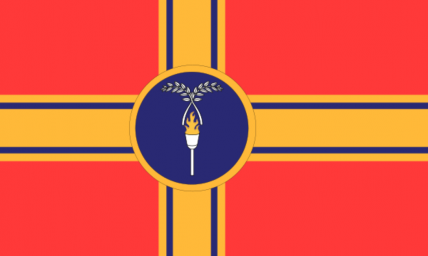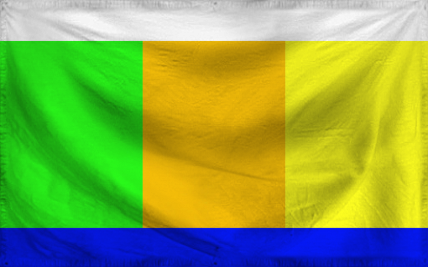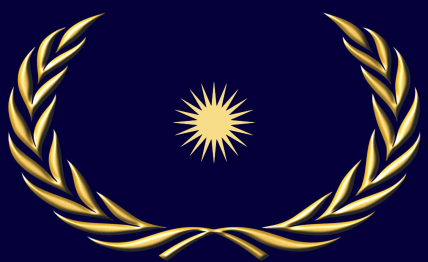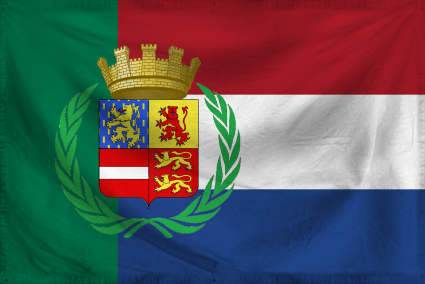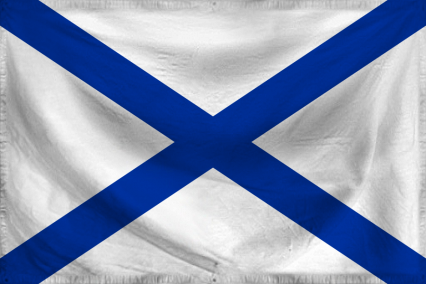Freedom and Political Power
By degree of civil and political rights:
[x] Liberal or libertarian: considerable level of civil liberties and political freedoms upheld
[_] Authoritarian: restriction of political activities and personal autonomy
[_] Totalitarian: total control of society in adherence to state ideology
By level of democracy:
[x] Democracy: rule by the voting public
[_] Dictatorship: rule by unelected rulers
[_] Hybrid regime: mix of democracy and dictatorship
[_] Anarchy: a stateless or non-hierarchical society
By distribution of political power:
[_] Autocracy: highly consolidated in single dictator
[_] Oligarchy: widely distributed among ruling elites
[_] Representative democracy: rule through elected representatives
[x] Direct democracy: direct decision making by voters
[_] Participative democracy: mix of representative and direct democracy
[_] Lottocracy: random selection of politicians from population
By unelected groups which control the government:
[_] Aristocracy: hereditary, privileged elites
[_] Technocracy: those with specific expertise
[_] Noocracy: those with general intellect
[_] Theocracy: religious officials representing state religion
[_] Plutocracy: the rich, according to their wealth
[_] Stratocracy: members of the military
[_] Corporatocracy: a single or few business corporations
[_] Particracy: one or more political parties, through their cadres
[x] Ethnocracy: a racial or ethnic group with legal supremacy
[_] Bureaucracy: unusually powerful civil servants
[_] Kritarchy: judges, acting as political leaders
[_] None: elite groups have limited control over the government
[_] Other: (describe here)
Legislature and Elections
By number of chambers/houses in legislature:
[_] Unicameral: only one chamber
[x] Bicameral: an upper and lower chamber
[_] Multicameral: three or more chambers
[_] No legislature: an advisory council acts as a consultative assembly with no legislative power
By electoral system for lower or only chamber:
[x] Proportional system: % share of votes determines share of seats
[_] Majoritarian system: seats won based on plurality or majority in each district
[_] Mixed system: compromise or combination of majoritarian and proportional systems
[_] Indirect or no election: elected or appointed by other politicians
By party system:
[_] One-party system: only one party is legally able to rule
[_] Dominant-party system: one party rules without effective opposition
[_] Two-party system: two opposing parties with limited third party competition
[_] Two-and-a-half-party system: two dominant parties with significant third party role
[x] Multi-party system: many political parties compete with each other
[_] Non-partisan system: political parties are absent from elections and political office
Head(s) of State and Government
By type of head of state:
[_] Republic: legitimacy of head of state formally derived from the people
[_] Constitutional monarchy: monarch has few actual powers by law or in practice
[x] Semi-constitutional monarchy: monarch exercises considerable but limited powers
[_] Absolute monarchy: absolute power resides in the monarch as the face of the nobility
[_] Hereditary republic: type of republic similar to monarchy, position of president-for-life inherited by political dynasty
[_] Elective monarchy: monarchy is chosen by group of people, not necessarily the public
By selection of head of government:
[x] Parliamentary system: chosen by confidence of legislature, head of state usually symbolic
[_] Presidential system: chosen independently of legislature, often head of state as well
[_] Semi-presidential system: power shared between parliamentary head of government and presidential head of state
[_] Provisional government: part of transitional government or coup junta following regime change
[_] Ex officio leader: in office by virtue of leading separate institution such as ruling party, state religion, or royal house
Separation of Authorities
By civil-military relationship:
[_] Civilian rule: civilian politicians have control over the military and its major decisions
[x] Military rule: military officers have an extensive role in major political decisions
By church-state relationship:
[x] Religious state: recognizes an official religion, can be (but not necessarily) theocratic
[_] Secular state ("soft secularism"): protects religious freedom through tolerance
[_] Secular state ("hard secularism"): separates religious practices from public life
[_] Atheist state: opposes the existence of religious faith
Laws and the Constitution
By legal system(s):
[x] Common law: legal precedent from judges has significant role, adversarial court system
[_] Civil law: emphasis on codified laws from legislatures, inquisitorial court system
[_] Religious law: derived from interpretations of religion(s)
[_] Customary law: informal or traditional legal systems
[_] Socialist law: civil law adapted to Marxist-Leninist ideology
By form of constitution:
[x] Written constitution: supreme law of the land is codified in single document
[_] Unwritten constitution: uncodified body of customs, precedents, and various laws
[_] Constitution suspended: current government has no constitutional basis or martial law has been declared
The Economy
By ownership of means of production:
[x] Capitalism: private ownership of means of production, for profit, to invest in further economic activity
[_] Socialism: social ownership of means of production by the entire public, workers, and/or communes
[_] Neither: other form of ownership
By resource allocation:
[_] Market economy: relies on the market to distribute products based on supply and demand
[_] Planned economy: directs economy according to state planning to achieve desired results
[x] Mixed economy: makes significant use of both markets and planning
[_] Neither: other form of allocation
By historical and theoretical economic systems:
[_] Communism: stateless, classless, and moneyless society
[_] Distributism: private property owned evenly as possible, centers on communities and families
[_] Autarky: total or near total isolation from international trade
[_] Mercantilism: increase of exports, decrease of imports, and colonial expansion
[x] Feudalism: manorial system defined by peasants farming under lords
[_] Slave-based economy: dependent on slavery for labor, often in plantations
[_] Hunter-gatherer society: non-sedentary bands of foragers
[_] None: none of these systems are present
[_] Other: (describe here)
Sovereignty and the State
By autonomy of subdivisions:
[x] Unitary state: all powers are vested in the central government
[_] Devolution or decentralization: self-government exists, but may be revoked by central government
[_] Federation: self-government is entrenched in the constitution
[_] Confederation: cohesive military and economic league between governments
[_] Supranational union: central authority with loose decision making powers over member states
By sovereignty:
[x] Sovereign state: a state with independence from other states and control of its own territory
[_] Client state: a smaller state strongly influenced or controlled by a stronger one
[_] Occupied territory: a territory which has been invaded or annexed by another state
[_] Empire: one state has control over many states or territories
By state stability:
[_] Consolidated state: no imminent threats to public services or law and order
[x] Fragile state: severe decay of governmental functions other than national security
[_] Failed state: extensive loss of perceived legitimacy and monopoly on force
[_] Collapsed state: central government no longer exists in practice
Additional Notes
By official or dominant ideology:
[_] There is one: (describe here)
[x] None: no overall ideology in power
Questions? Comments? Information about YN’s political system not included in any section?
By degree of civil and political rights:
[x] Liberal or libertarian: considerable level of civil liberties and political freedoms upheld
[_] Authoritarian: restriction of political activities and personal autonomy
[_] Totalitarian: total control of society in adherence to state ideology
By level of democracy:
[x] Democracy: rule by the voting public
[_] Dictatorship: rule by unelected rulers
[_] Hybrid regime: mix of democracy and dictatorship
[_] Anarchy: a stateless or non-hierarchical society
By distribution of political power:
[_] Autocracy: highly consolidated in single dictator
[_] Oligarchy: widely distributed among ruling elites
[_] Representative democracy: rule through elected representatives
[x] Direct democracy: direct decision making by voters
[_] Participative democracy: mix of representative and direct democracy
[_] Lottocracy: random selection of politicians from population
By unelected groups which control the government:
[_] Aristocracy: hereditary, privileged elites
[_] Technocracy: those with specific expertise
[_] Noocracy: those with general intellect
[_] Theocracy: religious officials representing state religion
[_] Plutocracy: the rich, according to their wealth
[_] Stratocracy: members of the military
[_] Corporatocracy: a single or few business corporations
[_] Particracy: one or more political parties, through their cadres
[x] Ethnocracy: a racial or ethnic group with legal supremacy
[_] Bureaucracy: unusually powerful civil servants
[_] Kritarchy: judges, acting as political leaders
[_] None: elite groups have limited control over the government
[_] Other: (describe here)
Legislature and Elections
By number of chambers/houses in legislature:
[_] Unicameral: only one chamber
[x] Bicameral: an upper and lower chamber
[_] Multicameral: three or more chambers
[_] No legislature: an advisory council acts as a consultative assembly with no legislative power
By electoral system for lower or only chamber:
[x] Proportional system: % share of votes determines share of seats
[_] Majoritarian system: seats won based on plurality or majority in each district
[_] Mixed system: compromise or combination of majoritarian and proportional systems
[_] Indirect or no election: elected or appointed by other politicians
By party system:
[_] One-party system: only one party is legally able to rule
[_] Dominant-party system: one party rules without effective opposition
[_] Two-party system: two opposing parties with limited third party competition
[_] Two-and-a-half-party system: two dominant parties with significant third party role
[x] Multi-party system: many political parties compete with each other
[_] Non-partisan system: political parties are absent from elections and political office
Head(s) of State and Government
By type of head of state:
[_] Republic: legitimacy of head of state formally derived from the people
[_] Constitutional monarchy: monarch has few actual powers by law or in practice
[x] Semi-constitutional monarchy: monarch exercises considerable but limited powers
[_] Absolute monarchy: absolute power resides in the monarch as the face of the nobility
[_] Hereditary republic: type of republic similar to monarchy, position of president-for-life inherited by political dynasty
[_] Elective monarchy: monarchy is chosen by group of people, not necessarily the public
By selection of head of government:
[x] Parliamentary system: chosen by confidence of legislature, head of state usually symbolic
[_] Presidential system: chosen independently of legislature, often head of state as well
[_] Semi-presidential system: power shared between parliamentary head of government and presidential head of state
[_] Provisional government: part of transitional government or coup junta following regime change
[_] Ex officio leader: in office by virtue of leading separate institution such as ruling party, state religion, or royal house
Separation of Authorities
By civil-military relationship:
[_] Civilian rule: civilian politicians have control over the military and its major decisions
[x] Military rule: military officers have an extensive role in major political decisions
By church-state relationship:
[x] Religious state: recognizes an official religion, can be (but not necessarily) theocratic
[_] Secular state ("soft secularism"): protects religious freedom through tolerance
[_] Secular state ("hard secularism"): separates religious practices from public life
[_] Atheist state: opposes the existence of religious faith
Laws and the Constitution
By legal system(s):
[x] Common law: legal precedent from judges has significant role, adversarial court system
[_] Civil law: emphasis on codified laws from legislatures, inquisitorial court system
[_] Religious law: derived from interpretations of religion(s)
[_] Customary law: informal or traditional legal systems
[_] Socialist law: civil law adapted to Marxist-Leninist ideology
By form of constitution:
[x] Written constitution: supreme law of the land is codified in single document
[_] Unwritten constitution: uncodified body of customs, precedents, and various laws
[_] Constitution suspended: current government has no constitutional basis or martial law has been declared
The Economy
By ownership of means of production:
[x] Capitalism: private ownership of means of production, for profit, to invest in further economic activity
[_] Socialism: social ownership of means of production by the entire public, workers, and/or communes
[_] Neither: other form of ownership
By resource allocation:
[_] Market economy: relies on the market to distribute products based on supply and demand
[_] Planned economy: directs economy according to state planning to achieve desired results
[x] Mixed economy: makes significant use of both markets and planning
[_] Neither: other form of allocation
By historical and theoretical economic systems:
[_] Communism: stateless, classless, and moneyless society
[_] Distributism: private property owned evenly as possible, centers on communities and families
[_] Autarky: total or near total isolation from international trade
[_] Mercantilism: increase of exports, decrease of imports, and colonial expansion
[x] Feudalism: manorial system defined by peasants farming under lords
[_] Slave-based economy: dependent on slavery for labor, often in plantations
[_] Hunter-gatherer society: non-sedentary bands of foragers
[_] None: none of these systems are present
[_] Other: (describe here)
Sovereignty and the State
By autonomy of subdivisions:
[x] Unitary state: all powers are vested in the central government
[_] Devolution or decentralization: self-government exists, but may be revoked by central government
[_] Federation: self-government is entrenched in the constitution
[_] Confederation: cohesive military and economic league between governments
[_] Supranational union: central authority with loose decision making powers over member states
By sovereignty:
[x] Sovereign state: a state with independence from other states and control of its own territory
[_] Client state: a smaller state strongly influenced or controlled by a stronger one
[_] Occupied territory: a territory which has been invaded or annexed by another state
[_] Empire: one state has control over many states or territories
By state stability:
[_] Consolidated state: no imminent threats to public services or law and order
[x] Fragile state: severe decay of governmental functions other than national security
[_] Failed state: extensive loss of perceived legitimacy and monopoly on force
[_] Collapsed state: central government no longer exists in practice
Additional Notes
By official or dominant ideology:
[_] There is one: (describe here)
[x] None: no overall ideology in power
Questions? Comments? Information about YN’s political system not included in any section?


